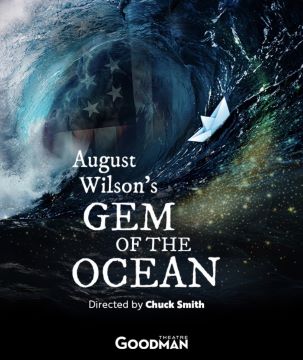SIMPLY SUBLIME
What a wonderful way to kick off Black History Month in the Windy City. The Goodman Theatre is revisiting a thoroughly engaging production of August Wilson’s Gem of the Ocean. For a three-hour-plus play, there wasn’t a wasted second. Originally staged back in 2003, what a wonderful twentieth year celebration offering this is. Traditionally, china is the anniversary present symbolizing “the beautiful and delicate balance of love over the past twenty years.” Here, Wilson’s words are the gift that kept on giving.
Ocean marked the first time in the theatre’s history that the Goodman has revisited one of Wilson’s works that had previously premiered there. For those not in the know, August Wilson was a Pittsburgh-born playwright who outspokenly understood the importance of race in artistry decades before it became in vogue. He championed Black performers, speaking in Black voices, produced by Black creative teams and leading that cherished philosophy to both creative and commercial success. Of note, the Goodman Theatre has produced all 10 works in Wilson’s “Century Cycle,” a series of interconnected plays (two of which became Pulitzer Prize winners) chronicling the Black experience in America by decades. This timeline included Gem of the Ocean (1904), Ma Rainey’s Black Bottom (the roaring twenties), Fences (1957), Two Trains Running (the turbulent sixties) and King Headley II unfolding (1985). Be forewarned, being an August Wilson play, there was some raw language, but for those familiar with his work, that’s to be expected. Director Chuck Smith expertly wove the threads of Wilson’s words and a remarkable ensemble of actors into a winning tapestry of redemption, revelation and heartbreak.
The action is set in the Hill District living room of 1839 Wylie Avenue, Pittsburgh, Pennsylvania. The world was full of harsh realities in the post slavery years, the South desperately holding on to its racial divides, the North not as welcoming as promised. A powerful knocking at the door comes from an anguished Citizen Barlow (Sharif Atkins), who is desperately trying to get a meeting with the mysterious Aunt Ester (Lisa Gaye Dixon) a sage/conjurer/witch doctor of a character with the reputation and perceived ability to “wash men’s souls of their burdens” (the wise women is also rumored to be 285 years old). Hers is the moral compass that doesn’t always point due north, but has a lasting impact on all who come within her contact. She’s looked after and protected by caregiver, Eli (A.C. Smith) and a stoic housekeeper named Black Mary (Sydney Charles), who is prone to a few well-timed and well-received Act II outbursts. Ms. Charles does more with her signature side eye on stage than Wilson could have ever imagined when writing this character — and we are all the better for it.
Also hanging about Ester’s abode is a recently freed slave, Solly Two Kings (James A. Williams), and travelling salesman Rutherford Selig (Gary Houston), a mischievous gaffer in cahoots with all of Ester’s strategies — even the ones that may be skirting the law. As the play’s antagonist, the always winning Kelvin Roston, Jr. is Police Chief Ceasar, a greedy and manipulative proud boy, working the law to further his own avaricious agenda, who just so happens to be Black Mary’s brother. Not thrilled with his sister working as a domestic, and less thrilled Citizen Barlow has eyes for his sibling, the Chief abuses his badge and station, his character an oh-so-familiar archetype that we see playing out daily on the modern nightly news.
As Citizen Barlow works his way to his own eventual redemption, the creative team’s work shines as well. Linda Buchanan’s exaggerated perspective, wooden-slatted set design was at one point a structure, the next a textured slave ship prison. Robert Perry’s bold lighting, partnered with “City of Bones” slave ship projection designed by Mike Tutaj, impresses. These breathtaking visual renderings add immeasurable depth and dimension to the powerful Act II scene. Not for the casual viewer, every line and every prop has meaning, propelling the story forward — so it is important to pay attention. No minute details here. Everything on set has significance, including a paper boat that later proves quite significant. The passing of the torch to the younger generation during the riveting final scene is a wonderfully executed punctuation to an astounding production.
It is impressive to note there are multiple productions playing right now in Chicago with largely Black casts and creative teams to choose from. The strongest of them is now open at the Goodman Theatre, where Ocean shines bright. 180 minutes-plus in a mask wasn’t a problem for the sold-out crowd I attended with. COVID-19 pandemic mask mandates and proof of vaccination are still required and kudos to the eagle-eyed ushers for being on top of the audience members not in accordance to the very publicized rules and regulations. As for the drama unfolding on the stage, Ocean was simply sublime.
photos by Liz Lauren
Gem of the Ocean
Goodman Theatre’s Albert Theatre
170 North Dearborn
ends on October 20, 2019
for tickets, call 312 443 3800 or visit Goodman Theatre
for more shows, visit Theatre in Chicago








